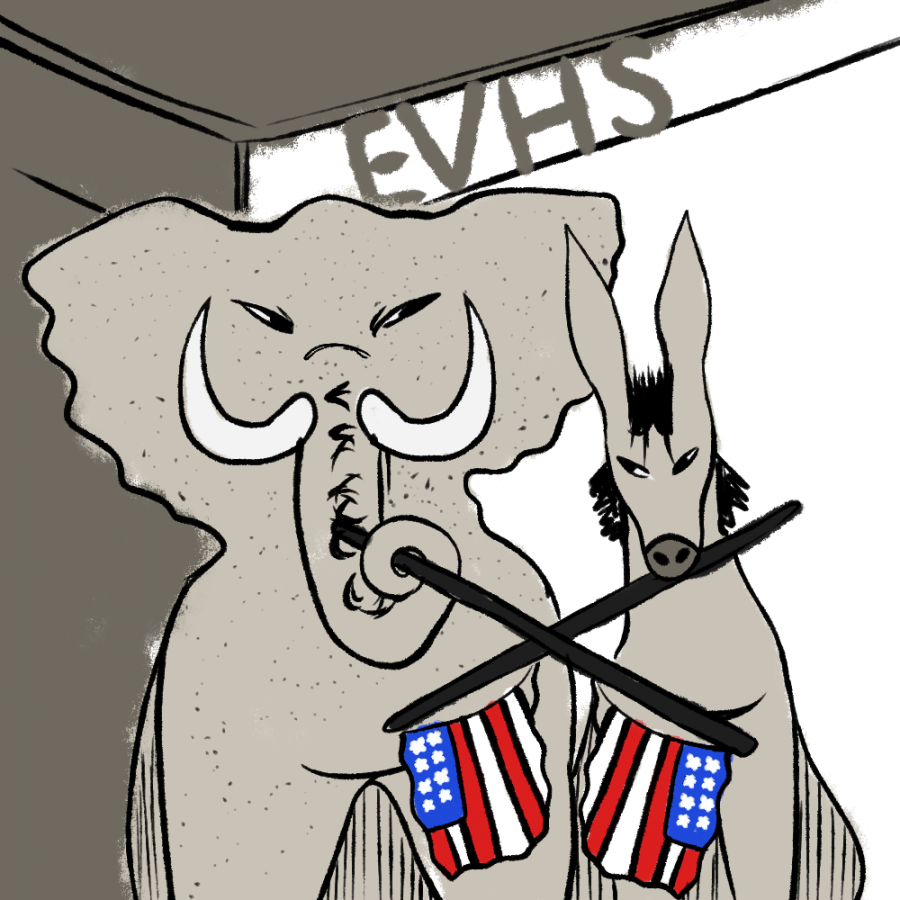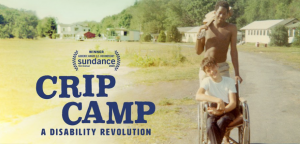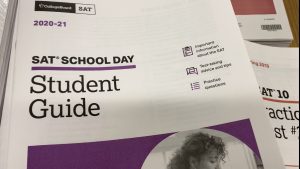First Amendment in School
Students engage their freedoms to express political opinions
Illustration by Caitlyn Weathers ’21
November 6, 2020
With the election and results looming, there have been many showing their support for both candidates and using their first amendment rights. Even after this election passes, there are sure to be more protests and public assemblies. As they happen, it is important to know what the First Amendment protects and what is or isn’t allowed at school.
A rally last weekend in the Eagle Valley parking lot brought this idea center stage. On Saturday, October 24th, a group of people gathered at the high school in order to spread their support for President Trump. The group was not approved to use school property, and were asked to leave. The Sheriff’s office was contacted. However, the group had already left by the time they arrived, and there was no further action required.
The Eagle County Republicans denied having taken part in organizing the rally, and no one has stepped forward as the organizer of the event.
The school’s request for the group to leave last weekend was within their rights because it is private property.
“There is a common misconception that school property is public, so sometimes groups don’t realize they need to have permission to use the facilities,” Assistant Superintendent Dr. Katie Jarnot explains. “School property, including the parking lot, is private property owned by the school board. We allow organizations to use our facilities and property all the time and are happy to do so, but it is important that the school district have contact and insurance information on file. The school district needs to be free from liability if someone were to get hurt or property were to be damaged.”
After the requests are received, it is up to administration to decide whether or not they will allow the event to take place. They ask themselves, “Is it something that is what we would deem school appropriate or something we want to have on our campus?” Principal Mr. Greg Doan explains, “we can deny acceptability if we deem it’s either unsafe or something about it isn’t in alignment with our general sort of school policies.”
Had that group filled out the proper forms, “I would have sought to say no because it’s just not our place to be part of partisan politics,” Mr. Doan explains.
That is not to say that the school would not allow any political events. They would just look to make sure that they’re balanced. Mr. Doan thinks he would allow permission for something like a debate where both parties are represented.
“We don’t want the perception that somehow our school is a political place,” Doan says. “I would want to make sure there was a fair chance for both to be able to do something. If one came to me and said we want to hold a rally, I’d almost feel compelled to say well, I want to make sure the other side has a rally too. Or some voice or representation because I wouldn’t want it to be that somehow we are just one sided.”
Schools try to refrain from partisan activities because they “must be a place where all students are safe, comfortable, and allowed to appropriately express their views. It is our job as educators to support the diversity of views and experiences of our students, families, and communities,” Dr. Jarnot explains.
These are all challenges for anyone looking to hold an event on school property. Students will always have to be at school during the school day, and it is important to remember that students still have the right to free speech.
The Student Press Law Center is a non-profit organization that provides free legal consultations to student journalists to help protect their freedom of the press.
Sommer Ingram Dean, a Staff Attorney with the Student Press Law Center explained, “School officials can censor you only if they can prove that your behavior or your speech is going to cause a material or substantial disruption to the school day.” Additionally, “They would not be able to stop it just because they don’t like what you’re saying.”
Supreme Court case Tinker v Des Moines makes it so students and teachers don’t shed their first amendment rights when they enter the schoolhouse gates. As students look to express their opinions at school in the coming days, they must do so in ways that do not disrupt the learning environment or the orderly flow to the school day. Students who choose to engage their freedom of speech, assembly, or petition on school grounds outside the school day must get proper approval for their event. Otherwise, it can get shut down, and that is not considered censorship. Just because students have these freedoms does not mean they are free from the consequences of using them.






